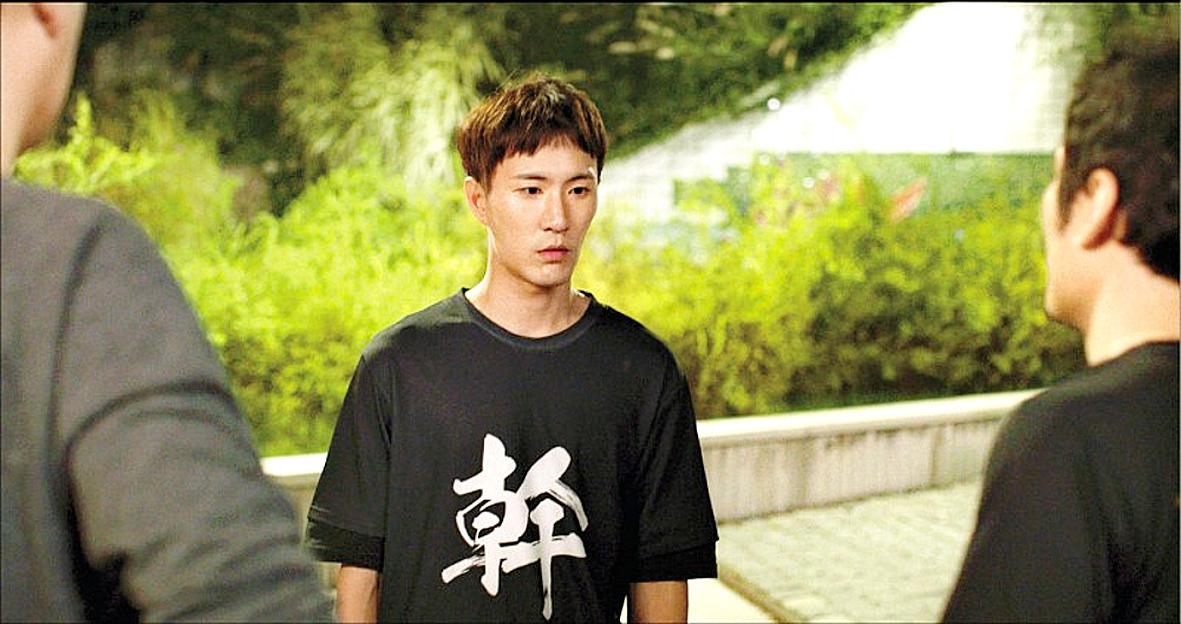Not every movie can remain earnest and heartwarming despite the protagonist strolling around his South Korean hometown in a T-shirt emblazoned with Taiwanese obscenities. It gets more absurd later when we find out he owns different colors of the same shirt, and even his Korean love interest wears one.
However, it’s a fitting juxtaposition in Jang-Gae: The Foreigner as the mixed-heritage Gwang-yong (Ho Yeh-wen, 賀業文) tries to be as Korean as he can, clashing with his parents about giving up his Taiwanese passport for a South Korean one. His strict father insists on speaking to him in Mandarin, constantly reminding him to remember their roots.
Ho delivers the nuances of the extremely introspective Gwang-yong’s personality well, perhaps because he also shares a similar background as a third-generation Chinese-Korean. The movie’s title, transliterated as “sauce dog,” is a derogatory term toward people of such backgrounds, referring to a time when Chinese immigrants in Korea were restricted to working in restaurants that sold black bean sauce noodles. It is Gwang-yong’s least favorite Chinese food: you just can’t cover up the smell, he says not-so-subtly.

Photo courtesy of Joint Entertainment
This identity is often confusing, even to Chinese-Koreans like the Lee family, who do not have roots in Taiwan. His father was born in South Korea to Chinese immigrants fleeing the Chinese Civil War, but over half a century later they’re still seen strictly as “foreigners” and don’t have Korean citizenship. Since they emigrated when the Chinese Nationalist Party (KMT) still ruled China, they ended up with Taiwanese documents after the party retreated to Taipei.
Like many overseas Chinese during those days, Gwang-yong’s father attended university in Taiwan. But since he doesn’t have household registration in Taiwan, he couldn’t enjoy full rights despite his citizenship, making this marginalized group feel stateless. Until 2015, they even had to obtain visas to visit Taiwan, and the movie briefly shows footage of “passport equality” protests in front of the Taipei Mission in Korea.
Gwang-yong’s father grew up in a time when Chinese in South Korea were denied citizenship, restricted from property rights and barred from attending Korean schools. Things have changed for Gwang-yong’s generation, but he still suffers from discrimination and is denied significant opporturnities solely due to his status.

Photo courtesy of Joint Entertainment
“They look Chinese but they’re not Chinese, they have Taiwanese passports but they’re not Taiwanese, they were born in South Korea but they’re not Korean,” Director Chang Chih-wei (張智瑋) told the press after the film premiered at last year’s Tokyo International Film Festival.
This quandary is not explicitly explained in the film, but the never-ending challenges that Gwang-yong faces are enough to pique the viewer’s interest in the oft-forgotten issue. After all, not even all people in the situation are aware of it — not even Gwang-yong, who can’t explain to a classmate why he has Taiwanese citizenship.
Despite this background, the plot is actually quite typical for this sort of coming-of-age film, with too many cliched narrative devices designed for emotional appeal. Perhaps that’s what Gwang-yong would want, however, as a regular teen just longing to fit in.

Photo courtesy of Joint Entertainment
But even the cheesier scenes are made somewhat intriguing with Gwang-yong’s identity constantly looming. For example, after one of those “let’s let loose at the amusement center” scenes that inevitably ends up in a karaoke box, his love interest insists that he sings a Mandarin song. He’s surprisingly good despite his usual reluctance to speak the language.
Gwang-yong’s character development is also strong enough to keep the interest of those who want more than just a teen romcom. Director Chang’s experiences as a half Taiwanese, half Korean who grew up in South Africa definitely contributes to the intricacies of such a character.
Chang explained the T-shirt’s significance during the movie’s premiere last year in Tokyo, noting that besides a swear word, gan (幹) also means “just do it” and “tree trunk.”
Through prominently displaying the offending character throughout the movie, Chang wants to draw the audiences attention to the intense conflict and internal discord felt by young Chinese-Koreans like Gwang-yong.
The terms “Hell Joseon” and “Ghost Island Taiwan” are also brought up in the film, used by cynical youth unhappy with their respective countries. Gwang-yong is aware of both terms, but that still doesn’t help him feel accepted in either place.

Taiwan has next to no political engagement in Myanmar, either with the ruling military junta nor the dozens of armed groups who’ve in the last five years taken over around two-thirds of the nation’s territory in a sprawling, patchwork civil war. But early last month, the leader of one relatively minor Burmese revolutionary faction, General Nerdah Bomya, who is also an alleged war criminal, made a low key visit to Taipei, where he met with a member of President William Lai’s (賴清德) staff, a retired Taiwanese military official and several academics. “I feel like Taiwan is a good example of

March 2 to March 8 Gunfire rang out along the shore of the frontline island of Lieyu (烈嶼) on a foggy afternoon on March 7, 1987. By the time it was over, about 20 unarmed Vietnamese refugees — men, women, elderly and children — were dead. They were hastily buried, followed by decades of silence. Months later, opposition politicians and journalists tried to uncover what had happened, but conflicting accounts only deepened the confusion. One version suggested that government troops had mistakenly killed their own operatives attempting to return home from Vietnam. The military maintained that the

Jacques Poissant’s suffering stopped the day he asked his daughter if it would be “cowardly to ask to be helped to die.” The retired Canadian insurance adviser was 93, and “was wasting away” after a long battle with prostate cancer. “He no longer had any zest for life,” Josee Poissant said. Last year her mother made the same choice at 96 when she realized she would not be getting out of hospital. She died surrounded by her children and their partners listening to the music she loved. “She was at peace. She sang until she went to sleep.” Josee Poissant remembers it as a beautiful

Before the last section of the round-the-island railway was electrified, one old blue train still chugged back and forth between Pingtung County’s Fangliao (枋寮) and Taitung (台東) stations once a day. It was so slow, was so hot (it had no air conditioning) and covered such a short distance, that the low fare still failed to attract many riders. This relic of the past was finally retired when the South Link Line was fully electrified on Dec. 23, 2020. A wave of nostalgia surrounded the termination of the Ordinary Train service, as these train carriages had been in use for decades